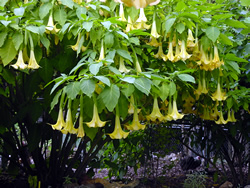August 2, 2007
Plant of the Week
by
David Rodriguez
 Angel’s Trumpet (Burgmansia solanaceae) is a very unique hardy plant. During most years in Texas, you can allow it to be grown in full sun to partial shade year after year!
Angel’s Trumpet (Burgmansia solanaceae) is a very unique hardy plant. During most years in Texas, you can allow it to be grown in full sun to partial shade year after year!
Though labeled as a poisonous plant, only if large amounts are consumed, it will cause illness or even possibly death. This makes all parts of the plant very distasteful to deer and other varmints. Being a Dutura type plant, the Angel’s Trumpet does not produce the toxic seed pods which are common with other Durantas. The Angel’s Trumpet grows to a height of 8-10 feet, if left un-pruned, they will grow anywhere from 4-12 feet wide. They can also be pruned to promote a fuller more compact plant forcing more bloom production. They are best grown as medium sized shrubs or small trees.
The large, long, trumpet flowers come in a variety of colors: pink, yellow, and white. They bloom in the late evening, emitting an angelic scent. They bloom throughout the night till dawns’ light. Foliage of the Angel’s Trumpet is evergreen to semi-evergreen. The leaves are large and similar to that of a tobacco plant, but smaller. They prefer to be grown in warm to hot climates in a fertile well-drained soil. During the growing season, the Angel’s Trumpet does need to be adequately watered. For fertilization you should fertilize with a 19-5-9 analysis every four to six weeks for maximum bloom production. For a burst of foliage, you can apply a good dose of 19-5-9 analysis in the early spring and late summer. You will have to keep the White fly and spider mites under control. For those of you that prefer to garden with container pots, a full grown Angel’s Trumpet is happy growing in a ten gallon pot as long as you occasionally trim the roots and replace the soil. When it’s cool enough get out and enjoy your garden!
Remember, Learn and Have Fun!
David Rodriguez is County Extension Agent-Horticulture, Bexar County. For more information, call the Master Gardener ‘Hotline’ at (210) 467-6575 or visit our County Extension website at http://bexar-tx.tamu.edu, click under Horticulture and Gardening.